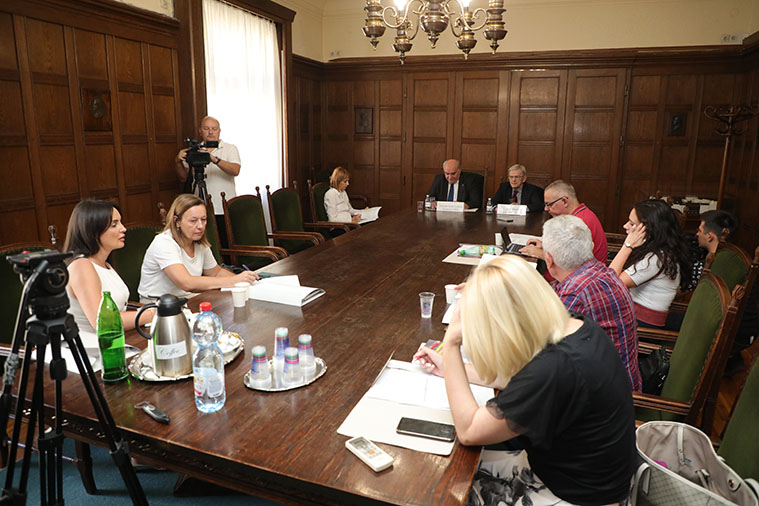Press conference on SASA Activities
A regular press conference was held at the Serbian Academy of Sciences and Arts on Tuesday, 16 September, during which Academician Zoran Knežević, SASA President, presented the Academy’s programme of activities to be realised by the end of 2025.
Out of the 139 events scheduled within the Academy’s diverse four-month programme, the SASA President placed special emphasis on ‘The World Conference on Science and Art for Sustainability’ planned for 23 to 24 September 2025 in Belgrade. The event’s initiator is the World Academy of Sciences and Arts, and the host is the Serbian Academy of Sciences and Arts, with co-hosts being the Alliance of National and International Science Organisations for the Belt and Road Regions (ANSO) and UNESCO. Additional institutions taking part in the organisation are The Earth-Humanity Coalition, WAAS, The Club of Rome with its Serbian Chapter, and the UNESCO-MOST BRIDGES Coalition. Academician Knežević noted that the United Nations (UN) General Assembly, following a proposal submitted by Serbia, proclaimed the years 2024–2033 as the International Decade of Sciences for Sustainable Development. One of the main global events within the general Decade programme will be this very conference.
SASA President pointed out that as part of the celebration of the Year of Academician Đuro Daničić, two scientific conferences are planned: Two Centuries of Đuro Daničić (27–28 November, SASA Grand Hall) and 200 Years since the Birth of Đuro Daničić (SASA Branch in Novi Sad). In addition, an exhibition dedicated to the life and work of this renowned philologist and lexicographer will be opened at the SASA Gallery, authored by Academician Zlata Bojović.
As part of the lecture series Current State and Perspectives of Natural Resources of Serbia in the Era of Climate Change, Energy Transition and New Directions of Economic Development, seven lectures by leading domestic and foreign experts in these fields are expected. The second lecture series,’ Updates in Diabetes 2025’, successfully launched in April 2025, will bring new scientific sessions by the most eminent experts in this field of medicine.
Academician Knežević also addressed the programmes realised by the SASA Branch in Novi Sad and the SASA Branch in Niš, as well as the SASA and University of Kragujevac Centre for the Scientific Work, which prepared a rich scientific and cultural programme for the next four months.
As part of the SASA art programme, the exhibition Stojan Ćelić: Shifted Boundaries of Space has recently concluded. The next exhibition, Mladen Srbinović: Man as the Measure of All Things, authored by Svetlana Mitić and Mirko Kokir and organised by the SASA Gallery in cooperation with the Museum of Contemporary Art, will open on 30 September. Marking the centenary of the birth of this distinguished artist, academician, and professor, the exhibition pays tribute to Srbinović’s work, which left a lasting imprint on the Serbian and Yugoslav art scene from the second half of the 20th century through the first decade of the 21st.
By the end of this year, the SASA Gallery of Science and Technology will host five exhibitions: 125 Years of Power Electronics in the World (22 September – 11 October), authored by Academician Slobodan N. Vukosavić and Professor Vladimir A. Katić, PhD; Plants and Stones – Geobotanical Sketches, authored by SASA Corresponding Member Marjan Niketić (second half of October – 12 November); Heroines – The Legacy of Roma Women’s Emancipation in Serbia (second half of November); On Architecture 2025 (3–17 December); and 60 Years of Moore’s Law and 40 Years of the World of Computers, authored by Academician Zoran Lj. Petrović, Professor Dragan Mitraković, and Zoran Mošorinski (December 2025 – end of January 2026).
On this occasion, Academician Aleksandar Kostić, director of the SASA Audiovisual Archives and Centre for Digitisation, put forward the programme of the scientific conference titled ’Culture: Long-term Strategic Investment’ which will take place on 5-6 December at the SASA. He emphasised that this two-day event forms part of the series Strategic Directions of Serbia’s Development in the 21st Century, launched by SASA in 2012. The series encompasses five conferences dedicated to education, science, culture, economy, and state polity—undoubtedly the key pillars on which every organised state rests. Each conference of the first cycle, which concluded in 2022, was followed by the publication of a collection of papers.
With the finalisation of the first conference cycle, the need emerged for conferences dedicated to these areas to become a long-term activity of the Serbian Academy of Sciences and Arts, which would ensure the continuous engagement of the Serbian Academy of Sciences and Arts in key issues of Serbia’s development. At the same time, the proceedings of the previously mentioned conferences stand as a kind of testimony to how a part of the Serbian elite perceived the problems and conceived solutions in these fields.
The conference Culture: Long-term Strategic Investment will address the strategic importance of culture in the era of globalisation, try to identify the issues in the field of culture in Serbia, and seek to put forward concrete proposals for overcoming them. Particular emphasis will be placed on the need to position culture within Serbia’s long-term strategic priorities.
Nineteen speakers will participate in the conference, with their presentations to be published in the proceedings. Following the event, two one-day symposia will be organised: The State and Role of National Cultural Institutions in Novi Sad, and another in Niš dedicated to the financing of culture.
Academician Aleksandar Kostić stressed that the Program Committee concluded that culture currently hangs on the margins of state interest, as evidenced by the fact that only 0.5 per cent of the national budget is allocated to it.
“If the state does not have a long-term strategic vision for the field of culture, and if it fails to invest in it, the consequences may prove very dire,” noted Academician Kostić. He underlined that one of the key tasks of this scientific conference is to propose a framework for how the state should approach culture, one of the most valuable achievements of any organised society.

